Beyond the Blue: Papahānaumokuākea ROV and Mapping
(EX2503)
Meet the Explorers

Sara Kahanamoku-Meyer
Expedition Science Co-Lead - Assistant Researcher, University of Hawaiʻi at Mānoa
Sara Kahanamoku-Meyer, Ph.D., is a marine paleoecologist who uses fossil records from ocean sediments to study how ecosystems responded to rapid climate changes in the past. They primarily work in "invisible timescale" fossil systems, applying records with 1 to 100-year temporal resolution to connect micro-scale processes to macro-scale patterns. They work closely with federal and state agencies to apply their paleontological research towards developing management strategies that meet conservation challenges. Dr. Kahanamoku-Meyer holds a B.S. in geology and geophysics from Yale University and a Ph.D. in integrative biology from the University of California at Berkeley. They are currently an assistant researcher at the University of Hawaiʻi at Mānoa with faculty positions in the Hawaiʻi Sea Grant College Program and the Department of Earth Sciences.
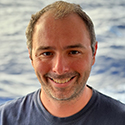
Brian Kennedy
Expedition Science Co-Lead - Chief Scientist, Ocean Discovery League
Dr. Brian Kennedy is the External Science Advisor for the Beyond the Blue campaign as well as a deep-sea ecologist who has spent over a decade in ocean exploration. His basic research focuses on understanding how environmental drivers influence the biodiversity and distribution of deep-sea organisms. As part of that work, he is always looking for ways to increase the pace and efficiency of ocean exploration through both the development of new technologies and the novel utilization of existing technologies. Brian started his career as a NOAA Corps officer then went on to earn his Ph.D. in marine ecology from Boston University. He has published numerous peer reviewed articles and other publications relating to deep-sea ecology, ocean exploration, and underwater technology development. Brian is currently the Chief Scientist at the Ocean Discovery League and a visiting researcher at Boston University.
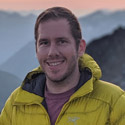
Sam Cuellar
Expedition Coordinator, NOAA Ocean Exploration
Sam Cuellar is a physical scientist with NOAA Ocean Exploration. With a background in underwater archaeology, Sam specializes in mission and survey planning and the collection and interpretation of numerous types of geophysical data from oceanographic systems, including autonomous underwater and remotely operated vehicles and novel one-off technologies. Sam received his bachelor’s degree in anthropology and master’s degree in nautical archaeology from Texas A&M University, focusing on the development of a low-cost, off-the-shelf infrared imaging system to aid archaeological conservators in better diagnosing the state of recovered artifacts and revealing details invisible to the human eye. He is currently finishing his doctorate in nautical archaeology at Texas A&M, exploring the cultural maritime landscape of the abandoned 19th century port city Indianola, Texas, and surrounding Matagorda Bay. Sam’s research fuses newly collected geophysical data with ecological, historical, and archaeological contexts to better understand how various Indigenous and European groups were impacted by and morphed the landscape in which they settled. With 11 years of underwater archaeology experience, Sam has had the fortune of investigating an abandoned World War I fleet in a Texas river, excavating a wrecked 17th century Venetian merchantman carrying goods for the Ottoman Sultan in Croatia, and searching for the lost ships of Hernán Cortés along the Gulf Coast of Mexico.

Olivia Andrus-Drennan
Video Editor, Global Foundation for Ocean Exploration
Olivia Andrus-Drennen graduated from Montana State University with a master’s of fine arts degree in science and natural history filmmaking and two bachelor’s degrees from Purdue University in wildlife biology and film/video studies. With these degrees, she has pursued her passion in creating science-based documentaries for companies all around the world such as The Marine Mammal Center, Marine Mammal Foundation, Don Edwards San Francisco Bay National Wildlife Refuge, Guadalupe River Park Conservancy, Indiana Department of Natural Resources, and the American Chemical Society. When she isn't filming, Olivia spends the majority of her time hiking around her home in Bozeman, Montana.
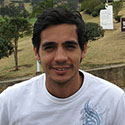
Fernando Aragon
Technical Team Member, Global Foundation for Ocean Exploration
Fernando Aragon graduated from the University of Hawai‘i at Manoa with a bachelor’s degree in mechanical engineering. During his studies, he gained experience in several fields, including conceptual design, aerospace research, mechanical design, robotics, and software development. From these activities he was able to intern for NASA at the Jet Propulsion Laboratory, present research at a national conference, and even co-author a technical paper in the Journal of the Astronautical Sciences. His most recent position was at the Field Robotics Laboratory (FRL), where he helped support operations, testing, and software development for two unmanned surface vehicles. From his time in FRL, he discovered a true passion for development and design of robotic systems. Originally from Colombia, Fernando enjoys outdoor activities and currently resides in State College, Pennsylvania.
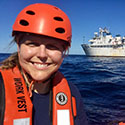
Caitlin Bailey
Video Editor, Global Foundation for Ocean Exploration
Caitlin Bailey became a member of the Global Foundation for Ocean Exploration video team and started sailing aboard NOAA Ship Okeanos Explorer in 2016. She is a "bi-polar" explorer, having been to both the Arctic and Antarctica, as well as a National Geographic Explorer. Caitlin is passionate about wildlife and sharing the deep sea and polar regions with a wide variety of audiences. She has a Master of Fine Arts in science and natural history filmmaking from Montana State University and a Bachelor of Science in animal biology from Texas A&M University-Corpus Christi. When not at sea, Caitlin resides in San Antonio, Texas, where she enjoys SCUBA diving, hiking, and entertaining her labradoodle, Camie.
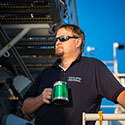
Roland Brian
Video Engineer, Global Foundation for Ocean Exploration
Roland Brian brings 38 years of electronics and satellite experience, with 29 of those years focusing on television and video engineering specialization. Throughout his early years in television, Roland worked to hone his skills and experience for various television stations and remote broadcasters as well as national broadcasters ranging from CBS, PBS, CNN, CNBC, MSNBC, ESPN, Fox Sports, and the Golf Channel. With a keen eye for precise high-quality, high-definition video, he really enjoys and helps bring the imagery to life for the viewers. Roland began his career in the U.S. Air Force where he worked as a satellite communications engineering technician with visions of working on the U.S. Space Station. He traded in that quest for one of deep-ocean exploration and sharing the beautiful imagery with the world. He has worked with NOAA Ocean Exploration since 2010 and plays an integral part in telepresence-enabled remotely operated vehicle (ROV) expeditions. He has also provided engineering design, integration, and operation services for other projects using various Global Foundation for Ocean Exploration (GFOE) and NOAA Ocean Exploration mobile telepresence systems. His duties aboard NOAA Ship Okeanos Explorer include operation and maintenance of the ship's telepresence and video and satellite systems, including those on ROVs Deep Discoverer and Seirios. Again, Roland’s experience embodies the breadth and depth of knowledge that GFOE and NOAA Ocean Exploration encourage. When not at sea, Roland enjoys life with his wife and family in sunny Sarasota, Florida.
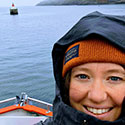
Neah Baechler
Mapping Watch Lead, NOAA Ocean Exploration
Neah Baechler is a member of the NOAA Ocean Exploration Technical Operations Team with a multidisciplinary background in seafloor mapping, GIS, and marine geology on crewed and uncrewed platforms and a career focus in ocean exploration and sustainability. She graduated from the College of Charleston Benthic Acoustic Mapping and Sonar (BEAMS) program with a degree in geology in 2015 and launched her hydrographic career as an explorer-in-training aboard NOAA Ship Okeanos Explorer shortly after. She was a contractor predominantly on Okeanos Explorer and Exploration Vessel Nautilus, working with Kongsberg mapping systems and navigating for remotely operated vehicle dives until she joined Saildrone in 2022 as the lead surveyor for bathymetric data collection on uncrewed surface vessels (USVs). Neah was most recently the bathymetry operations manager at Saildrone, shaping drone capabilities and bathymetric procedures and pushing the envelope on USV capability. When she's not mapping the seafloor, you can find Neah in the garden, playing outside around her hometown of Portland, Oregon, and painting moody water colors.
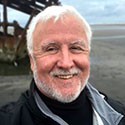
James Delgado
Senior Vice President, SEARCH, Inc. (participating from shore)
James Delgado, Ph.D., is one of the world’s leading experts in maritime archaeology and heritage. Dr. Delgado joined SEARCH in 2017 as Senior Vice President and has over 40 years of professional experience. He is responsible for ensuring operational and research excellence, implementing strategic initiatives, and expanding the firm’s international footprint. Dr. Delgado also serves as a public speaker, international delegate, documentary host, and major project spokesperson. Prior to joining SEARCH, Dr. Delgado served as the Director of Maritime Heritage in the Office of National Marine Sanctuaries for NOAA for seven years, where he implemented heritage programs and active research in the nation’s waters, as well as promoted outreach and education on America’s underwater and marine heritage. Previously, he served a four-year term as President and CEO of the Institute of Nautical Archaeology, the world’s leading scientific and educational organization dedicated to the understanding of humanity’s seafaring history through the excavation and scientific study of shipwrecks. Dr. Delgado was the Executive Director of the Vancouver Maritime Museum in British Columbia, Canada, for 15 years, and he served as Maritime Historian and Head of the U.S. government’s Maritime Heritage Program for the National Park Service for four years in Washington.
Dr. Delgado will be joining the expedition from shore as a participant during dives focused on maritime heritage.
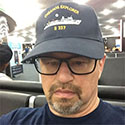
Brian Doros
Video Engineer, Global Foundation for Ocean Exploration
Brian Doros is a television broadcast engineer who was born in Long Branch, New Jersey. Active in sports throughout high school, Brian moved to Southern California and spent the next few years traveling the world surfing and then exploring his technical interests at college in San Diego, California. After changing his course of study to electronics, he focused on broadcast electronics and technical maintenance in broadcasting. His career path first led him to employment at IBM/MCA Video Laser Disc Company in Costa Mesa, California, doing research and development in the early days of optical laser disc, then to Los Angeles, where he specialized in film for television post-production. The next several years were spent working in the Hollywood post-production industry at Paramount Pictures, MGM/Lorimar Telepictures, 20th Century Fox, NFL Films, and Sony Broadcast Company North America, contributing to his 25 years of experience in television post-production and broadcast systems integration. After Hollywood, Brian worked in the field, traveling and upgrading network television facilities to digital broadcasting capabilities during the analog to digital conversion. He now has moved on to less broadcast traditional applications of his background working in his current position.
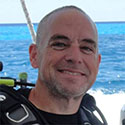
Mark Durbin
Data Engineer, Global Foundation for Ocean Exploration
Mark Durbin holds a bachelor’s degree in information technology and a master’s in computer information systems from Tarleton State University, where he focused on network security solutions. Mark has over 28 years experience in designing, testing, and supporting numerous variations of voice/data wired/wireless telecommunications networking solutions and security solutions, services, and products. During his career at MCI/Verizon, he held several engineering, research and development, and management positions and was with the company for over 23 years. During this time, he worked on key network projects and initiatives, including federal security solutions, access solutions, security services, virtualization, and many other large network solutions. In addition, he received four patents for networking and security solutions. Mark is married to Laura, his wife of 32 years, and has three kids and five grandkids. Some of Mark's hobbies and interests include car, truck, and boat repair/restoration; hiking; biking; running; camping; hunting; fishing; boating; amateur radio; storm chasing; home automation/security systems; fitness instructing; and scuba diving.
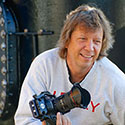
Art Howard
Video Editor, Global Foundation for Ocean Exploration
For more than 30 years, Emmy-award winning photographer and producer Art Howard has helped viewers experience life through images from 50 countries and 7 continents. A native of North Carolina, Art has followed researchers aboard multiple deep-sea missions, documenting the excitement and challenges of exploration. Art uses the latest video technology to bring viewers as close as possible to life at sea, capturing both scientists and the marine life they seek to understand. Art has spent the last 11 years independently producing media for the North Carolina Museum of Natural Sciences.
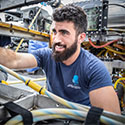
Sean Kennison
Mechanical Engineer, Global Foundation for Ocean Exploration
Sean Kennison first joined the Global Foundation for Ocean Exploration in 2014 while earning his undergraduate degree at the Pennsylvania State University. He sailed on NOAA Ship Okeanos Explorer as part of the engineering team and assisted with various design projects throughout his senior year. Upon graduating at the top of his class with a bachelor’s degree in mechanical engineering and a minor in engineering mechanics, he joined the team full time. Sean regularly maintains the vehicles and continually works on improvements to keep them up-to-date with technological advances. He has gained invaluable experience and knowledge through the seasons, onshore and offshore, that has turned him into a versatile engineer. Initially starting as a passionate navigator, Sean has grown to become a skilled pilot and is a proven lead for the remotely operated vehicle expedition team.
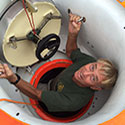
Terry Kerby
Retired (participating from shore)
Terry Kerby, now retired, was operations director and chief pilot for the Hawaii Undersea Research Laboratory (HURL) from 1981 until 2019. Terry led HURL operations on expeditions throughout the Pacific with the submersibles Makalii, Pisces IV, and Pisces V from 1981 to 2017. Terry has had a passion for the ocean and ocean exploration since he was a boy, starting his submersible piloting career with the submersible STAR II in the South China Sea in 1979.
Terry continues his connection with the ocean with his two-mile reef care and maintenance swims off the island of Oahu. He’ll be joining the expedition from shore as a participant during dives focused on maritime heritage.
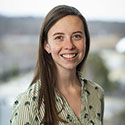
Anna Lienesch
Data Manager, NOAA’s National Centers for Environmental Information
Anna Lienesch is a data manager with NOAA’s National Centers for Environmental Information (NCEI) through the University of Maryland’s Cooperative Institute for Satellite Earth System Studies. After graduating with a marine science degree, Anna conducted long-term environmental monitoring programs across three continents where she developed a diverse background in biological, geological, chemical, and physical oceanography, emphasising data standardization throughout multiple state and federal programs. Anna has been with NCEI and NOAA Ocean Exploration’s Data Management Team since 2018, serving as an Okeanos Explorer sample data manager for more than five years. When not at sea, Anna serves as the team lead for NOAA Ocean Exploration’s competitive grant program’s end-to-end data management activities and is the NCEI liaison to various NOAA divisions and line offices. Anna is originally from Maryland, but currently resides in Colorado where she enjoys camping, hiking, and gardening.

Jon Mefford
Mechanical Engineer, Global Foundation for Ocean Exploration
Jon Mefford holds a bachelor’s degree in aerospace engineering from the University of Texas and a master’s degree in mechanical engineering from the University of Hawai‘i. He began his career working as a software test engineer on the Space Shuttle program for several years before moving to Hawai‘i to pursue his master's degree. During his time as a graduate student, he participated in a number of research expeditions aboard NOAA Ship Okeanos Explorer as a member of the remotely operated vehicle (ROV) team. This experience was invaluable to him as he worked on his degree, which focused on the design, development, and implementation of control systems for marine robotics. Since that time, Jon has spent more than eight years working as a test and integration engineer on the Orion Space Program, occasionally returning to support expeditions with the Global Foundation for Ocean Exploration. He remains passionate about both space and deep-sea exploration and appreciates the many parallels that can be drawn between them. Jon currently resides in Denver, Colorado.
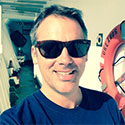
Jason Meyer
Mapping Watch Lead, University Corporation for Atmospheric Research
Jason Meyer first pursued his passion for seafloor exploration while earning a bachelor’s degree in geology from the University of Hawaiʻi at Hilo where he studied volcanic processes along the Hawaiian Islands. He later went on to receive his master’s in geology from the University of South Carolina, focusing on regional mapping and classification of seafloor volcanoes along the East Pacific Rise and the Galapagos Spreading Center in the Pacific Ocean. Since graduating in 2006, Jason has followed a career as a hydrographer, mapping and exploring the ocean as well as coasts, rivers, reservoirs, and lakes throughout North America, the Pacific, and the Atlantic. He has endured long hours and challenging conditions at the helm and the computer collecting data that serves maritime navigation, dredging and construction operations, environmental remediation projects, and academic exploration. Jason first sailed aboard NOAA Ship Okeanos Explorer in 2015 and has participated in more than 10 expeditions. While not at sea, he enjoys climbing, surfing, backpacking, and traveling with his family. Jason resides in Battle Ground, Washington.
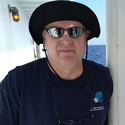
Jim Meyers
Systems Administrator, Global Foundation for Ocean Exploration
Jim Meyers attended Williams College and received a bachelor’s degree in history. He has worked in the information technology field for over 20 years, including 19 years at various positions at Sea Research Foundation in Mystic, Connecticut. He is married with two adult children. Outside of work, he is an avid soccer fan and plans European vacations around match schedules.
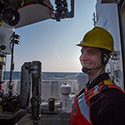
Bobby Mohr
Electrical Engineer, Global Foundation for Ocean Exploration
Bobby Mohr is a systems/robotics engineer specializing in autonomous and remotely operated underwater vehicles. He holds a bachelor’s degree in physics and graduated cum laude from Davidson College in 2009. Bobby started his career as an engineering technician with Greensea Systems where he was responsible for the design, development, and testing of autonomous underwater vehicle control systems. Bobby realized that he would enjoy the design-build process more if he was able to also pursue the challenges of making vehicles work successfully at sea. After serving on several projects at Greensea, where he specialized in electrical and software systems support, Bobby joined the Global Foundation for Ocean Exploration (GFOE) as an electrical systems engineer. During his time at Greensea and now with GFOE, he has been one of the key electrical engineers on the development of the 6,000-meter-rated remotely operated vehicle system of Deep Discoverer and Seirios.
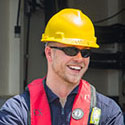
Chris Ritter
Remotely Operated Vehicle Team Lead, Global Foundation for Ocean Exploration
Chris Ritter first joined the Global Foundation for Ocean Exploration (GFOE) on the Cayman Rise Expedition in 2011, just prior to being hired full time by the Naval Sea Systems Command (NAVSEA). For the next three years, an informal NAVSEA-NOAA relationship allowed Chris to continue to participate in GFOE’s design, engineering, and offshore operations. Chris holds bachelor’s degrees in ocean engineering and aerospace engineering with a minor in mathematics from Virginia Tech. Chris has been a major contributor to GFOE’s design-build process and a tremendous asset to their offshore operations. He is a skilled navigator, pilot, and co-pilot and brings with him a level of enthusiasm that everyone around him appreciates and respects. In late 2014, Chris joined GFOE’s Mechanical Engineering team full time. He is enthusiastic about training the next generation and tackling new projects. Chris resides in Falls Church, Virginia.

Jordan Schweizer
Associate Scientist, National Centers for Environmental Information
Jordan Schweizer manages geophysical data at the National Centers for Environmental Information. She oversees the management, archiving, and publication of geophysical datasets, including single beam bathymetry, gravity, magnetic, side scan sonar, and sub-bottom data. Last season, she had the opportunity to sail on the Beyond the Blue: Hawaiʻi Mapping expedition, and she is excited to return this year as a sample data manager.

Levi Unema
Electrical Engineer, Global Foundation for Ocean Exploration
Levi Unema is an Eagle Scout from Lynden, Washington. He holds a bachelor’s degree in electrical engineering along with a Certificate in Electric Power Engineering from Michigan Technological University. Levi joined the Global Foundation for Ocean Exploration (GFOE) in 2016 and designs, builds, operates, and maintains GFOE’s remotely operated vehicles. Since joining the team, he has acquired many technical skills in the satellite communication field, in addition to the broadcast video field. Levi sails on most remotely operated vehicle expeditions on Okeanos Explorer, satisfying the roles of electrical engineer, navigator, pilot, co-pilot, and sometimes VSAT (Very Small Aperture Terminal) engineer. Levi resides in Newport, Rhode Island.